Do Aquarium Fish Sleep? Fish Sleep Habits (How, Where, and When)
Do fish sleep? Every fishkeeper has asked this question at some point. It may seem like a small-scale question, but understanding this mystery requires diving deep into fish biology. The truth is that the resting behavior of fish isn’t too different from that of land animals, although there are several key differences.
The short answer to the question of whether fish sleep is yes, they do, but not in the conventional sense. Scientists have observed a sleep-like state in many fish species, including goldfish, perch, zebrafish, parrotfish, and sharks. This makes sense because sleep and rest are vital to the health of any living being, including fish.
- How Do Fish Sleep?
- Where Do They Nap?
- When and How Long Do Fish Sleep?
- How to Create a Sleep-Friendly Environment in Your Aquarium
- Can Fish Sleep With Blue Light On?
- Do Nocturnal Fish Sleep During the Day?
- Can Fish Sleep While Moving?
- The Bottom Line
How Do Fish Sleep?
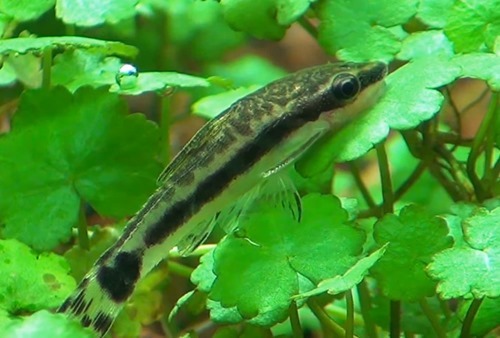 Otocinclus catfish
Otocinclus catfish
Many fish species appear to have sleep cycles and generally “go to bed” at night. Like humans, fish produce hormones that regulate their internal body clocks and sleep patterns. When they sleep, their breathing slows down, and they remain still.
Studies suggest there are two ways fish sleep. One is called alert rest, where the fish’s brain is asleep, but their senses remain active, keeping them prepared to swim away from any looming threat. The other is actual sleep, where all the fish’s activities are temporarily suspended.
How do you know if your fish is sleeping? Since fish lack eyelids, you can’t tell by looking at their eyes, as they never close them, even when asleep. However, you can observe their behavior. Active fish like bettas, tetras, and danios become less active and may lie motionless when sleeping. Goldfish exhibit similar behavior.
As for how fish breathe while sleeping, it depends on the species. Many species breathe by opening and closing their mouths to keep water flowing toward their gills, allowing them to hover motionless for long periods. Other species move their fins up to twice as fast as normal to maintain oxygenated water flow over their gills. Some fish sleep in currents, swim slowly, remain motionless, or stay half-awake to keep breathing.
Where Do They Nap?
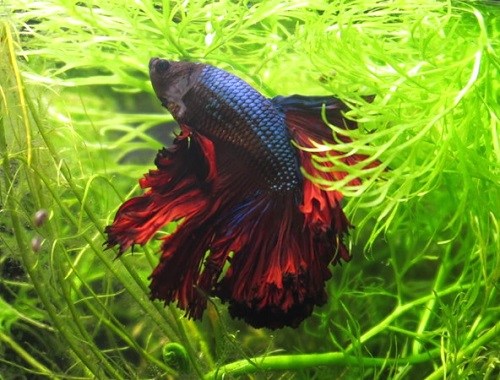 Male Betta fish between aquarium plants
Male Betta fish between aquarium plants
How and where fish nap varies by species. Loaches, for instance, tend to sleep upside-down. Other fish swim to the bottom of the tank to rest. Bettas may lie on or wedge themselves between aquarium plant leaves to snooze. Tetras prefer to swim down to the substrate, sometimes floating almost vertically near it.
In the wild, some fish species wedge themselves between branches or plant stems to avoid being carried away by currents. Parrotfish are particularly interesting, as they secrete a “mucus cocoon” from a special gland to envelop their bodies before sleeping. This cocoon acts as a protective blanket that keeps parasites at bay.
You can tell your fish is sleeping when they are motionless, either hovering over the substrate or lying on a leaf or decor, appear less colorful than usual, and exhibit this behavior when the aquarium lights are off.
When and How Long Do Fish Sleep?

Fish can be nocturnal or diurnal. Smaller species, such as zebrafish and rainbow wrasse, are diurnal, meaning they tend to sleep at night. During sleep, zebrafish remain motionless and may change colors to disguise themselves from predators. Knife fish, however, are nocturnal and most active at night.
The duration of fish sleep depends on the species and environment. Some fish take short, frequent naps throughout the day, while others sleep only at night or during the day. Predatory fish often take advantage of darkness to hunt.
Aquarium fish adjust their body clocks to sync with the tank’s light schedule. They are most active during the day when the light is on and rest or sleep when the aquarium or room light is turned off in the evening.
How to Create a Sleep-Friendly Environment in Your Aquarium
Just like humans, fish need a proper environment to rest well. While they don’t have eyelids to close or beds to crawl into, they do rely on darkness, calm surroundings, and a sense of safety to settle down.
Here are a few tips to help your fish get the rest they need:
- Turn off the aquarium lights at night. Most fish follow a natural day-night cycle, so aim for around 8–10 hours of light and 12–14 hours of darkness. Keeping the lights on too long can stress your fish and disrupt their biological rhythm.
- Avoid loud noises or sudden movements near the tank at night. Vibrations or sharp light changes can startle resting fish and interrupt their rest.
- Add hiding spots and plants. Many fish feel safer sleeping when they can tuck themselves into caves, behind driftwood, or among dense aquatic plants.
- Use a timer for consistency. Setting your aquarium lights on a timer helps establish a predictable routine, which makes fish feel secure and encourages healthy sleep behavior.
A stable, peaceful environment at night ensures your fish wake up active, colorful, and stress-free.
Can Fish Sleep With Blue Light On?
Unless you have nocturnal fish, you should not leave any light, including blue light, on in your aquarium at night. Most aquarium fish synchronize their biorhythms with the tank’s light schedule. Leaving blue light on at night disrupts their sleep cycle, causing them to lose precious rest.
The quality of sleep affects many aquarium fish behaviors, including mating and feeding. Whether using blue light or not, it’s crucial to leave the aquarium in complete darkness at night. In the wild, fish lack a light source at night and use the darkness to rest or sleep. Following this pattern ensures aquarium fish get adequate sleep and maintain their energy levels.
Do Nocturnal Fish Sleep During the Day?
Yes! Just like owls and bats, nocturnal fish are most active at night and rest during the day. Common nocturnal aquarium fish include plecos, certain catfish species, kuhli loaches, and knife fish. These species often spend the daylight hours hiding under decorations or buried in substrate, only emerging once the lights go out.
If you have nocturnal fish in your tank, it’s essential to understand their schedule:
- Provide shaded hiding areas where they can feel secure during the day.
- Feed them during their active hours—which might mean offering food after lights are off.
- Don’t mistake inactivity for illness. It’s normal for nocturnal fish to be less visible during the daytime.
Balancing tank mates between diurnal (day-active) and nocturnal species can add fascinating variety to your aquarium, but it also requires some awareness of their opposing rhythms.
Can Fish Sleep While Moving?
Surprisingly, yes—some fish sleep while still moving, especially those that need constant water flow over their gills to breathe. Species like certain sharks and tuna lack a mechanism called buccal pumping, which lets fish breathe without swimming. As a result, they must keep moving to stay alive—even while resting.
These fish enter a state of “partial sleep,” where only part of their brain shuts down, allowing them to stay alert to danger and continue swimming. This phenomenon is called unihemispheric slow-wave sleep (USWS)—a trait they share with animals like dolphins and some birds.
While most common aquarium fish like tetras, guppies, and gouramis do stop swimming completely during sleep, this fact about some wild or pelagic species shows just how fascinating and adaptable fish behavior can be.
The Bottom Line
In conclusion, fish, like other animals, sleep and need sufficient rest to stay healthy and live longer. To ensure your fish get enough sleep, maintain a regular schedule for your aquarium light—keeping it on for a set number of hours during the day and turning it off at night when you go to bed. An aquarium light with a timer can simplify this process by automatically managing light cycles.
It’s also important to understand your fish’s behavior. Are they nocturnal or diurnal? Do they rest on leaves or hide behind rocks? Knowing these behaviors will help you decorate your tank appropriately. Some fish are comfortable sleeping in the middle of the tank, while others prefer to hide.
Consider these factors to keep your fish happy and healthy!

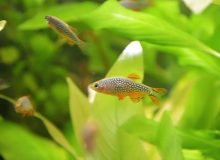
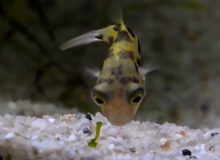
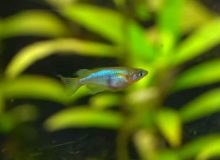
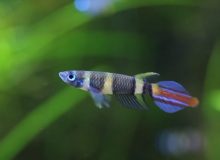


Leave a Reply